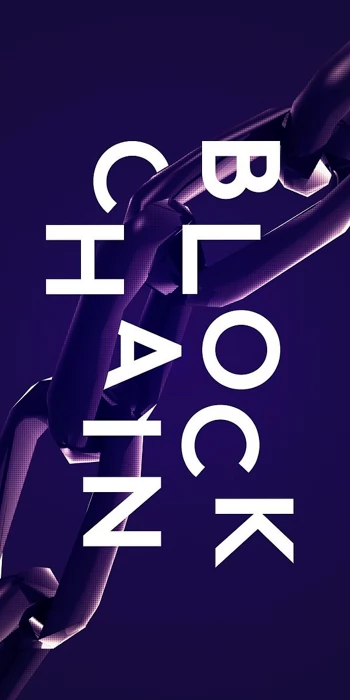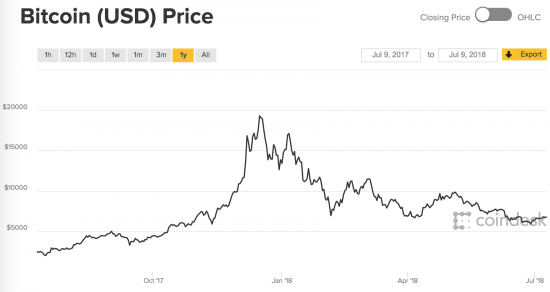Fill in your details and we'll contact you.
We’re committed to your privacy. Mothership uses the information you provide to contact you about our relevant content, products, and services. You can unsubscribe from these communications at any time.

INTRODUCTION
Cryptocurrencies are everywhere these days. Even if you don’t follow the development of the market, you can’t avoid the ups and downs of Bitcoin and other currencies. One success message is followed by news of horror, with Bitcoin peaking at $19,697 per coin on December 7, 2017. Being the first decentralized cryptocurrency, Bitcoin is of course the most widespread currency, but it is by far not the only one. CoinMarketCap currently lists 792 different coins.
This article was last updated on 07/09/2018
Title picture: By Davidstankiewicz (Own work), Blockchain Purple,
[CC BY-SA 4.0], via Wikimedia Commons
But what do these currencies have to do with gaming and the games industry? To answer that question, let’s first take a quick look at how cryptocurrencies work.
Bitcoin price development 2017. Source: CoinDesk
Just as with “real” money, cryptocurrencies can be used to buy digital and physical goods. But there are some important differences here. Firstly, unlike national currencies, cryptocurrencies are entirely digital and can therefore be used worldwide. Secondly, they are not issued by a central bank. Instead, they are organized and created through blockchain. Additionally, most of the coins can not only be bought or traded but also “mined”, as they are generated by the use of peer-to-peer networks.
So, what is blockchain?
A blockchain basically is a decentralized database or accounting system where all transactions are logged. Each record is visible to everyone and cannot be modified or deleted. There is also not one single organization maintaining the blockchain; everyone making a transaction adds an entry directly to the database. Due to this open nature, the use of cryptography and consensus among participants, and due to the lack of middlemen – for example banks or exchange traders - cryptocurrencies are seen as a more secure, cheaper and faster alternative to traditional money.
But it is not only about payment. A key element of the technology is that it is not tied down to cryptocurrencies but can store any form of data. Some consider blockchain to revolutionize the way businesses and even societies will be organized in the future.
Preventing voter fraud in public elections, offering new ways to reduce the effects of humanitarian emergencies, or improving health care systems are just some examples of actual and potentially beneficial blockchain uses. On the other hand, cryptocurrencies are still new and predictions of their use cases are of course speculative to some extent. Some argue that digital coins are simply a speculative bubble ready to burst. Others argue that coins are not the problem, but that insubstantial Initial Coin Offerings are.
Time will tell who is right, maybe some coins will not survive, but blockchain technology offers great potential and is here to stay.
So, how does the games industry come into play? There are several ways developers, publishers, and gamers can make use of digital currencies and blockchain. The first things that comes to mind is of course buying games with cryptocurrencies. An online, fast, and secure type of payment sounds predestined for purchasing digital goods. But as cryptocurrencies are shifting from means of payment over to objects of investment and speculation, fewer platforms are accepting them. Steam, for example, introduced Bitcoin payments in April 2016, but dropped support this December due to increased volatility and high transaction fees. Crypto payments will most likely not play a crucial role for gaming, but the underlying technology will. In the following we are going to show some examples of blockchain use for gaming.
In-game item trading
Many games such as CS:GO, PUBG, or DOTA 2 offer a variety of different skins to customize your looks. Some of them are quite rare and can therefore be sold for a higher price to others. Players buy and sell these items with real money all the time, always taking a risk that the person on the other end of the transaction is a scammer. With blockchain technology this problem could be a thing of the past. Both the seller and the buyer will know in advance whether the other person really has the skin or the money for the trade.
Games Marketing
Digital marketing is a complex venture these days with many cliffs to go around. We see a high usage rate of ad blockers, targeting difficulties, ad bots, malvertising, or declining revenues, just to name a few. Blockchain’s transparency and security features could potentially solve at least some of these problems. Quite a few projects and companies are working on ways to utilize blockchain technology for better ways of digital marketing.
Gaming on Demand
Cloud gaming has been around for a few years, but never really hit it off. Most gamers still rely on their own (expensive) gaming PCs to play the latest titles available. Gaming on demand providers today need to build high-end data centers with powerful GPUs and servers in order for gamers to stream games to their low-end computers. Companies such as Playkey want to open cloud gaming to a much broader audience. Based on blockchain technology, gamers or companies can share their computing power in exchange for cryptocurrency-based rewards. Through this incentive, GoD providers could reduce their hardware costs while gamers could play AAA titles for a much smaller amount of money.
eSports
As mentioned in our article on the eSports sector back in September, the competitive gaming scene is booming and there seems to be no end to its popularity. It is no surprise then that a lot of companies are trying to get into the market. And with blockchain technology, new opportunities are opening up. Theta Labs, for example, want to improve the quality of video streams by using a decentralized infrastructure based on blockchain. This way, providers can reduce their costs for operating a CDN while participating viewers will be rewarded for sharing their bandwidth. Others, like Play2Live, want to build entirely new ecosystems, where developers, publishers and streamers can monetize their content while viewers can interact with streamers more directly.
These are just a few examples of how blockchain technology could influence the games industry. Some of them will be successful, some of them will fail. The industry and the technology are still young and we will surely see more innovative new solutions in the near future.
MOTHERSHIP Marketing GmbH
Stefan Hinz
sh[at]mothersh1p[dot]de
Fill in your details and we'll contact you.
We’re committed to your privacy. Mothership uses the information you provide to contact you about our relevant content, products, and services. You can unsubscribe from these communications at any time.
Back